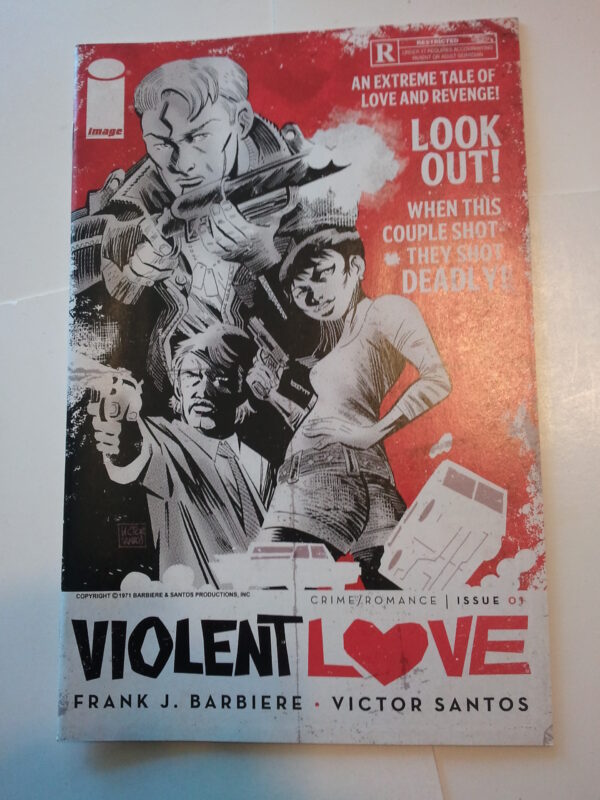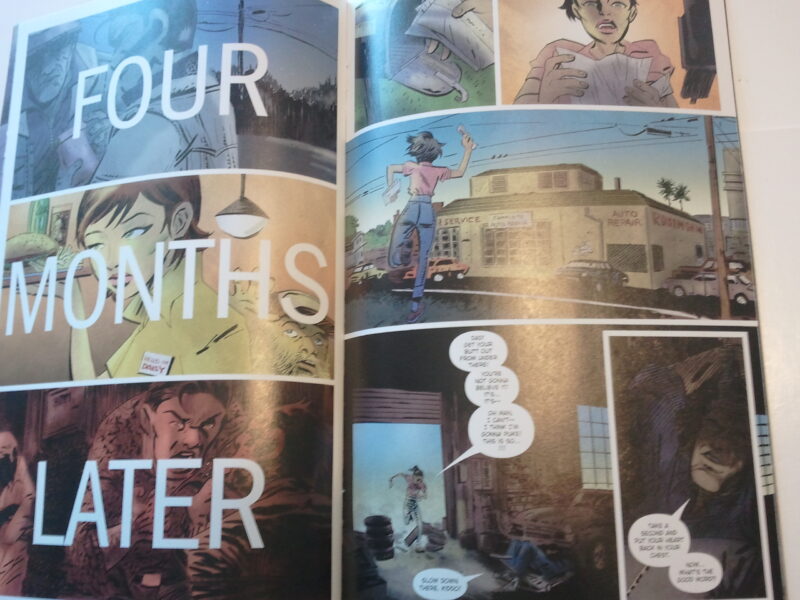Violent Love # 1 NM Image Comics Frank Barbiere Victor Santos 1st print Cover B
$39.99
Description
VIOLENT LOVE #1 Image Comics
WRITER Frank J. Barbiere
ARTIST Victor Santos
COVER B Victor Santos
SERIES PREMIERE!
Daisy Jane and Rock Bradley were two of the most notorious bank robbers in the American Southwest. And then they fell in love. Join FRANK J. BARBIERE (FIVE GHOSTS, The Revisionist) and VICTOR SANTOS (THE MICE TEMPLAR, Polar) for a pulp-infused criminal romance oozing with style and action! Double-sized debut issue!
Mulder and Scully, Courtney and Kurt, Beyonce and Jay Z, Harley and the Joker; the pop culture world is full of power couples. Now Image Comics are joining the loved up parade with their new book Violent Love.
Violent Love is “inspired by true events”, most notably Bonnie and Clyde being the most obvious of inspirations. The story starts in a rambling sort of way, the narrative being given as a case of history through which we are introduced to waitress Daisy Jane and her tolerance for the bad things that seem to fill her small town life. Still the darkness at the edge of this town goes a lot further than being man handled in the dinner (not a euphemism). Daisy’s Dad works hard to give the life that Daisy deserves, but a late night surprise that initially starts the break up and goes some way to shaping Daisy’s life.
Writer Frank J. Barbiere pulls together a story that is unrecognizable from the style last seen on Dejah Thoris. When I say unrecognizable, I don’t mean this as a bad thing. I enjoyed the Dejah book and I’m still a little confused at its and her sister books Vampirella and Red Sonja demise. Violent Love is a totally different affair, with Barbiere flexing his mature writing muscles. True, there are a couple of familiar tones and beats throughout the story , but as this is issue one it is pretty much a given that there needs to be some base level that readers can immediately buy into. Dialogue wise, the characters work well, with each having an impact and ramifications to deal with, which adds a level of realism to events.
Artist Victor Santos provides all the art in the book, with a sixties vibe that seems to be a mix of Jack Kirby and Bruce Timm, both structurally and with the figure work. The Timm elements are on show through little flourishes as well with some of the poses, especially with Daisy herself. At time though, Santos does go for a less is more approach allowing the reader’s eye to fill in the details. The main reason that this works, is that with Santos providing inks and colors then the emphasis used is somewhat truer than having to explain a look or style to at least two other people. Talking about the colors, there Santos displays some nice environment work, from the dusty heat of Texas to the blood covered innards of violence.
IMAGE COMICS: The cover of VIOLENT LOVE #1 gives off Bonnie & Clyde and Romeo & Juliet vibes, love and mayhem in equal parts. Tell us why VIOLENT LOVE is crime/romance, and what we should expect to see in this one.
FRANK BARBIERE: The project came about in a very organic way. Victor and I struck up an immediate friendship and camaraderie after collaborating on a project called Black Market, and knew we wanted to co-create something new together after that book wrapped. Victor had mentioned a fascination with the romance genre, and we just started talking about a lot of our shared interests and favorite genre pieces. From those talks, we arrived at VIOLENT LOVE.
I feel that both love and crime are rooted in passion, so that’s really the unifying element. VIOLENT LOVE is also a revenge story, and it’s really become a piece about the nature of these bigger concepts—most importantly love—leads us all to both create and destroy. Victor has such a strong, unique style, and when filtered through his brilliant art we get something wholly new and wonderful—I think he struck gold on this cover, and it’s a great statement of what this book is all about.
VICTOR SANTOS: I love stories in violent environments. I’m a romantic in the literary sense. VIOLENT LOVE is not like a Katherine Heigl movie laughs; it’s about great passions and an epic scope. Like War and Peace, The Illiad, or Frank Miller’s Daredevil, tales about the big words: Love, Hate, Revenge, Destiny, Tragedy. I think Frank and I share a common love for the Great Stories.
IC: The story of these two is pitched as something like folklore as one character tells the story of what began in 1969 to another character in 1982. Why’d you go with a nested flashback here, instead of just the story of 1969? What’s it add to the tale for you?
BARBIERE: I’ve become very fascinated with the function of the storyteller in fiction, and this seemed like a great project to work it in. There is a sense of folklore here, of Americana and larger than life characters, and I think having a storyteller helps amplify that. I don’t want to spoil where things go, but there is a very deliberate purpose for our frame story and we’ll discover it as the narrative moves forward. These are such wonderful time periods, and getting to jump around in between them really helps evoke nostalgia and style.
IC: “Daisy Jane” and “Rock Bradley” are classy names that sound like they’re straight out of a crime novel. Are you playing it fairly straight with the genre, or are you deconstructing or approaching it in a self-aware way, too?
BARBIERE: I’ve been a big fan of crime, especially in comics, but we definitely want to add something new to the mix. I think by taking a nostalgic/folklore-infused lens to the genre, plus the addition of a love story, really helps stir things up and turn VL into a unique beast. I would say we’re not necessarily deconstructing the genre, but elevating it and finding parallels within other genre types maybe not normally associated with crime. For me, it’s really about what I want to say with the piece, and I think we’ve found an excellent vehicle for the themes we want to drive home.
SANTOS: I love those names! I think if your main intention is deconstructing a genre, you will never get a good story. First, you build a solid story and develop the characters, and the process itself will tell you where you can place the book in the larger sense of genre. So, I prefer to begin, like my wiser heroes, with daily hard work…and later I’ll see what I get.
IC: Frank, you’ve spoken highly of Victor in the past. What do you dig about Victor’s work? What do you like about what he’s doing in this series?
BARBIERE: I think Victor truly is one of the modern masters of sequential storytelling, and collaborating with him has been one of the high points of my career. The style and energy he brings to even the simplest panels is astounding, and as a writer I’m in constant awe of his ability to elevate my scripts into exciting pieces of narrative art. Victor’s ability to come up with brilliant designs and the infusion of life and personality into his work are second to none, but I really just can’t get over how smart he has been with the panel layouts in this book. Comics are a medium with near-limitless potential, and I think Victor pushes the medium in exciting ways and really innovates on every page.
IC: Are you two working any real history into this story, or mostly sticking with fictional criminals?
BARBIERE: We’ve obviously drawn from a lot of influences, but I think we’ve arrived in a very nice “faux true crime” area. There will be tiny references to real things happening in the era, but largely we’ll be sticking with Daisy and Rock, who are largely fictional creations.
SANTOS: I think this story is the reflection of a real age that was wild, hard, and cruel in some ways. The characters are not real but I can understand the disenchantment of the people from their era. America is fascinated with bandits…in the ’70s, they were considered by a lot of people, mostly young people, as anti-establishment, almost like true rockstars! You can see it in movies like Badlands. I find the love and romanticizing of criminals more fascinating than the actual criminals laughs.
IC: Victor, you’ve done a few crime comics here and there, and you bring a new approach each time. How are you approaching the storytelling this time?
SANTOS: Crime is my favorite genre. I devour all kind of stories, from classics to real crappy exploitations, and I always search for a different approach. With my Polar graphic novels—an ultra stylized noir—I went for the basic patterns, limited colors, and high black & white contrast because I’m moving inside an unreal world of spies, almost superhero-esque.
But in VIOLENT LOVE, even while playing with some epic fiction, we have specific places and dates. I think setting is very important. I’m not talking about copying a lot of photos or movie captions, here. It’s about the atmosphere. Inks and colors are key here. I searched for a “sandy” approach, a dirtier texture with the inks, like in an old Gene Colan comic book printed on cheap paper. I use to color with a more “animated” style with sharpened color borders, but here I used soft degrees and a grainy texture…It’s not retro, I don’t want to copycat an old book, but I do want to evoke some nostalgia, some of the “imperfection” lost in comic books.
Every element builds a mood in the reader, and I try to use all the tools available.
IC: What excites you most about this story you and Frank are telling?
SANTOS: Well, this is the kind of story I could work on all my life, because we are trying to unite all the things—new and old—we love from this medium: a story about strong characters told in an original way, playing with the time period and the storytelling. I love the challenge of experimenting with old-fashioned art while simultaneously using the kind of avant-garde storytelling you could find in a modern book.
IC: Dylan, you’re responsible for the design of VIOLENT LOVE. What’s your take on how the book has to feel? Are you drawing from anything cool to give it a certain flavor?
DYLAN TODD: When Frank tapped me to come onboard, Victor had already done a lot of the first issue, and once I saw his jaw-dropping art and got a sense of the type of story he and Frank were telling, a lot of pieces dropped in place pretty quickly. Before you know it, I was throwing together a pin-board of vintage paperbacks and sleazy ’70s movie posters. And, if I’m being honest, I’ve been itching to do a “cut paper” style of lettering—the type you see on a lot of vintage crime books—for a comic logo, which sort of led to where we would end up for the final look: something sexy, dangerous, and inviting.
Near mint, 1st print. Bagged & Boarded.
Related products
-
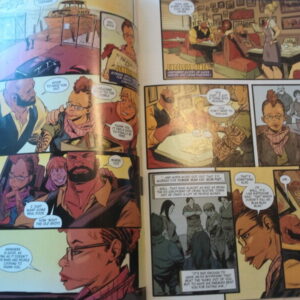
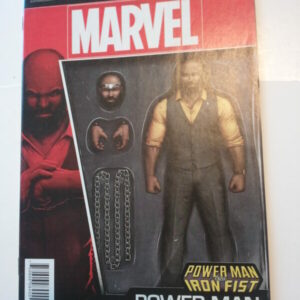
Power Man and Iron Fist # 1 NM Luke Cage Variant Cover David Walker Greene 1stpr
$44.99 Add to cart -
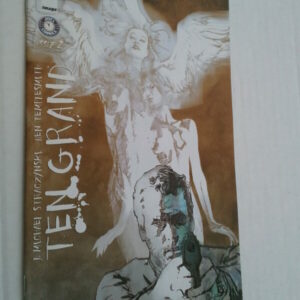
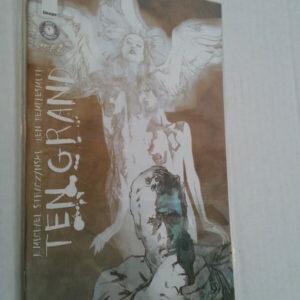
Ten Grand 2 NM Cover B Bill Sienkiewicz Image 1st print J Michael Straczynski
$54.99 Add to cart -
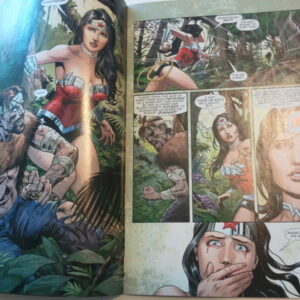

Wonder Woman 47 NM Harley’s Little Black Book Sketch Cover Amanda Connor 1st pr
$64.99 Add to cart -
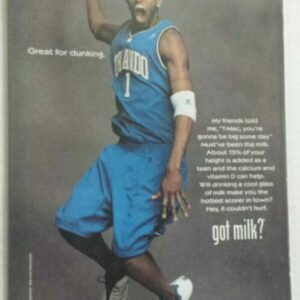
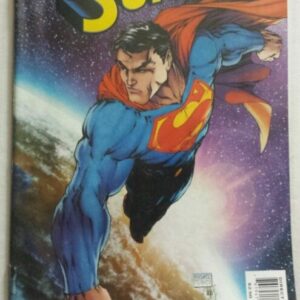
Superman 205b Michael Turner Variant Cover Azzarello Jim Lee Art 1st print
$32.99 Add to cart
